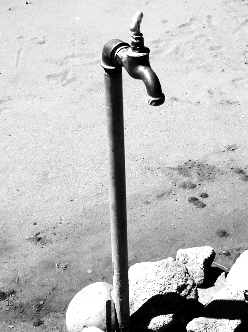New water plan slammed
 An Aboriginal land council has denounced a draft water allocation plan in the NT.
An Aboriginal land council has denounced a draft water allocation plan in the NT.
Representing the native title holders of Central Australia, the Central Land Council (CLC) has declared that the draft Western Davenport water allocation plan fails to provide any safeguards for significant sites and the surrounding environment.
The plan, which governs the management of groundwater in a vast region south of Tennant Creek, has been released for public feedback.
Encompassing 24,500 square kilometres of land, including Singleton Station - a proposed site for a major horticultural project that has been granted an unprecedented licence - the plan is intended to strike a balance between industrial needs and environmental sustainability to ensure the responsible utilisation of groundwater.
However, a water advisory committee has expressed concerns that the draft plan inadequately protects the arid desert environment under its purview, accusing the government of treating water as a commodity to be exploited. There are also fears that the plan puts cultural sites, flora, and fauna at significant risk.
The draft of the new plan was originally slated for public comment release in November of last year but faced delays due to the need for further consultation after key stakeholders voiced their lack of support.
Although the draft has now been made public, the Central Land Council has accused the NT government of engaging in disingenuous consultations leading up to its publication.
“The so-called consultation process involved two deceptive presentations by water planners who presented outdated information,” says Les Turner, CEO of the CLC and an Arrernte man.
The council maintains that the government promised traditional owners that the new plan would incorporate specific objectives ensuring the protection of cultural and environmental values.
However, according to the CLC, the draft plan merely states that Aboriginal cultural values should be “considered” when granting water licences.
Additionally, it grants permission to interfere with or damage 30 per cent of groundwater ecosystems and sacred sites.
One contentious aspect of the Western Davenport plan is the inclusion of a water license for Singleton Station, which is one of the largest in Australia. This licence would eventually permit the licence holder, Fortune Agribusiness, to extract 40,000 megaliters of groundwater annually. The licence has come under legal scrutiny and is currently the subject of a Supreme Court challenge.
The water advisory committee for the region has unanimously advised the NT government that its sustainable water extraction limit is excessively high.
Mr Turner criticised the government's alleged duplicity, asserting that while they claim to respect cultural and ecological knowledge on the international stage, their actions tell a different story.
“Any decline in the water table poses a risk of irreversible damage to sacred springs, soakages, and trees,” Mr Turner said.
“If water extraction is not carefully managed and limited, our land and culture will be sacrificed.”
The NT Department of Environment, Parks, and Water Security responded, stating that the plan was developed with input from the Western Davenport and Ti Tree Water Advisory Committee.








 Print
Print